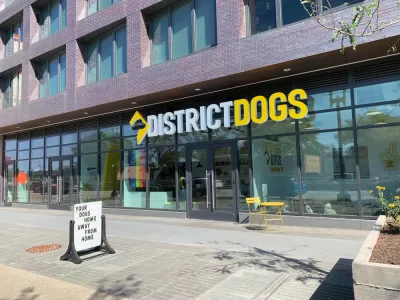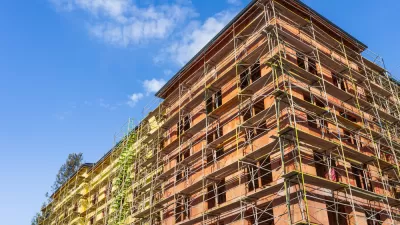Facing a severe housing shortage, Washington, D.C. grapples with how to approach the challenges presented by local stakeholders who oppose any and all development.

"Like the rest of the Washington region, D.C. is facing a severe housing shortage, and efforts to address it are regularly stymied by residents who want to insulate their neighborhoods from change," writes Ally Schweitzer.
In this discussion, the District's housing concerns are placed in context by the region's housing concerns. Earlier in September, the Metropolitan Washington Council of Governments put out a non-binding resolution calling on local governments to meet specific, ambitious housing targets.
"As of now, about 245,000 new housing units are forecast to be built in the region by 2030. The council proposes building 75,000 more homes on top of that to match the pace of job growth," wrote Schweitzer in an earlier article on that regional pronouncement.
As D.C. starts to consider its role in that equation, Schweitzer suggests that one of the causes of the District's housing shortages will remain one of its persistent challenges: "a formidable and constant political challenge is found among homeowners who appeal zoning decisions in court, testify against development-related legislation or find other ways to impede or shut down residential projects."
The counter strategy of shaming NIMBYs is only one of the approaches to the challenge explored by Schweitzer, and it's mostly dismissed as ineffective. For examples of other strategies that might work in moving the needle in favor of new residential development, an Urban Land Institute technical advisory panel recently produced a report on how to meet the District's goals [pdf] for new housing development.
FULL STORY: Is Shame The Antidote To NIMBYism In The Washington Region?

Planetizen Federal Action Tracker
A weekly monitor of how Trump’s orders and actions are impacting planners and planning in America.

Congressman Proposes Bill to Rename DC Metro “Trump Train”
The Make Autorail Great Again Act would withhold federal funding to the system until the Washington Metropolitan Area Transit Authority (WMATA), rebrands as the Washington Metropolitan Authority for Greater Access (WMAGA).

The Simple Legislative Tool Transforming Vacant Downtowns
In California, Michigan and Georgia, an easy win is bringing dollars — and delight — back to city centers.

The States Losing Rural Delivery Rooms at an Alarming Pace
In some states, as few as 9% of rural hospitals still deliver babies. As a result, rising pre-term births, no adequate pre-term care and "harrowing" close calls are a growing reality.

The Small South Asian Republic Going all in on EVs
Thanks to one simple policy change less than five years ago, 65% of new cars in this Himalayan country are now electric.

DC Backpedals on Bike Lane Protection, Swaps Barriers for Paint
Citing aesthetic concerns, the city is removing the concrete barriers and flexposts that once separated Arizona Avenue cyclists from motor vehicles.
Urban Design for Planners 1: Software Tools
This six-course series explores essential urban design concepts using open source software and equips planners with the tools they need to participate fully in the urban design process.
Planning for Universal Design
Learn the tools for implementing Universal Design in planning regulations.
Smith Gee Studio
City of Charlotte
City of Camden Redevelopment Agency
City of Astoria
Transportation Research & Education Center (TREC) at Portland State University
US High Speed Rail Association
City of Camden Redevelopment Agency
Municipality of Princeton (NJ)




























